Over the past 40 years, there has been significant debate about egg nutrition facts. In the 1970s, the public was told to reduce dietary cholesterol in order to reduce the risk of developing heart disease. Since eggs are the most concentrated source of dietary cholesterol, the public was cautioned against consuming more than 1 egg per day.
Later, the association between dietary cholesterol and heart disease was questioned heavily, and research indicated that eggs were only harmful when consumed in large quantities, at more than 1 egg per day.
Eggs are now making a comeback as a food being labeled "nutritious" once again, partially due to the recent anti-carb push (just look up how many people are talking about 'egg carbs', 'eggs carbs', and 'eggs carbohydrates').
Also, recent scientific opinion has called into question whether it is necessary to limit dietary cholesterol intake to less than 300 mg per day (the equivalent of about 1.5 eggs per day), due to conflicting information about the association between dietary cholesterol and blood cholesterol.
So in this article, we're going to break down some of these questions about eggs and help you understand why we tend to caution against a diet high in eggs.
Egg Nutrition Facts
In essence, there are two parts of an egg which are distinctly different from each other: the yolk and the white. In order to understand egg nutrition facts properly, let's understand the nutritional difference between the both parts.
The yolk is a storehouse of cholesterol, saturated fat, vitamins and minerals. One egg yolk contains 55 calories, 4.5 grams of total fat, 1.6, grams of saturated fat, 184 milligrams of cholesterol, and small amounts of vitamin A, vitamin D, vitamin B6, Iron and vitamin B12.
The egg white is mainly a storehouse of protein. One egg white contains 17 calories, 0 grams of total fat, 0 grams of saturated fat, 0 milligrams of cholesterol, 0 grams of carbohydrate, and about 4 grams of protein. In addition, the egg white contains no appreciable vitamins or minerals.
Take a look at the image below to understand more about egg nutrition facts:
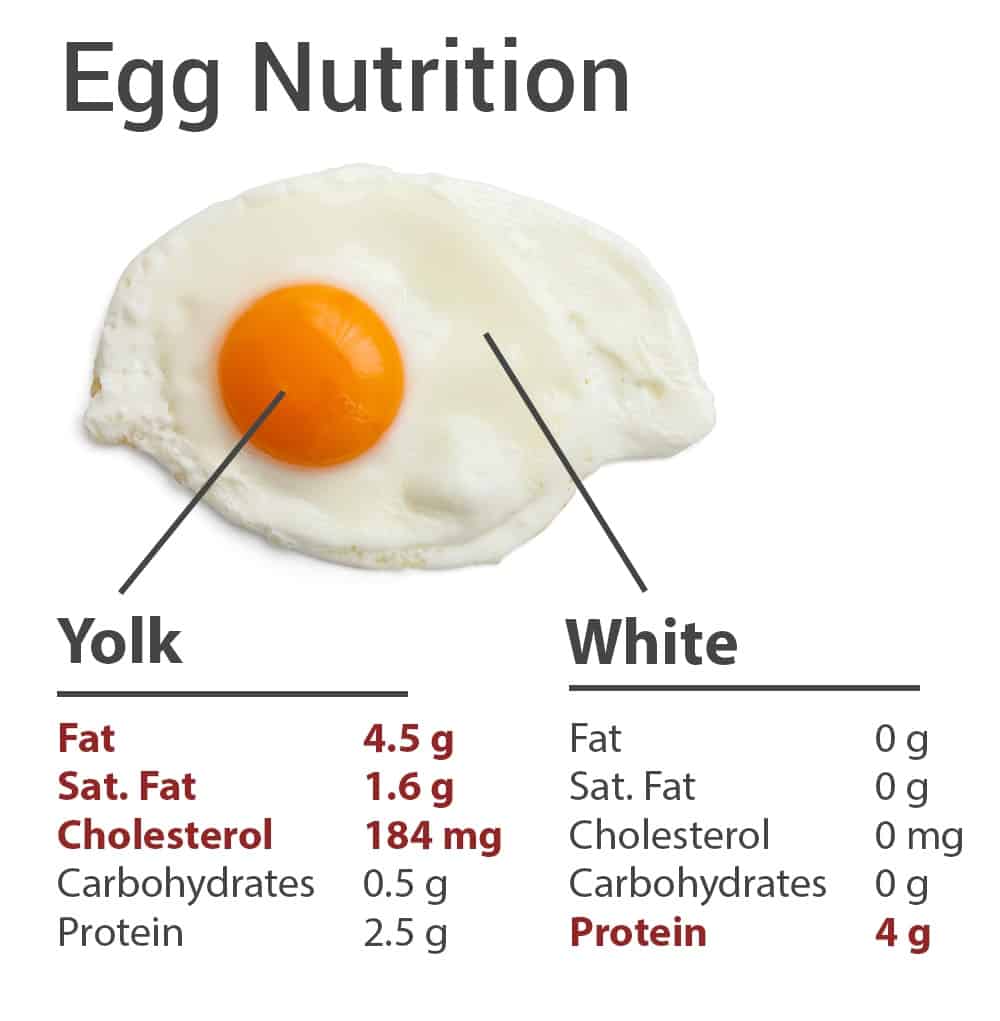
Eggs and Organ Health
In order to fully understand egg nutrition facts, it's smart to ask a simple question – how do eggs affect your risk for long-term disease, including heart disease, diabetes and cancer? By understanding the metabolic end effect of eating eggs, we gain insight into how eggs promote or reduce your risk for chronic disease.
In order to answer this question, we turn to the research. Most importantly, we must evaluate eggs from multiple perspectives, rather than simply focusing only on the connection between eggs and only a single chronic disease like diabetes or cancer.
Eggs and Diabetes
Adults with diabetes (type 1 or type 2) are 2 to 4 times more likely to develop heart disease or stroke than nondiabetic adults. The reason for this is simple: elevated blood glucose increases the risk for all forms of cardiovascular disease, including heart attack, stroke, angina, and coronary artery disease (2-4).
The 2008 Physicians Health Study found that people with diabetes significantly elevate their risk for all cause mortality after eating about five eggs per week (1), and two other studies involving more than 80,000 people found that eating more than 6 eggs per week significantly increases the risk of cardiovascular disease in people with diabetes (2-3).
Eggs and Arterial Plaque
Recent studies have linked egg consumption with an increase in arterial plaque. Researchers found that 3 eggs per week significantly increased arterial plaque formation in carotid arteries, significantly elevating the risk for hypertension, stroke and heart attack (5).
The authors suggest that the increase in arterial plaque due to egg consumption closely matches the increase in arterial plaque due to cigarette smoking, which suggests that eating eggs could mimic the effect of smoking cigarettes on cardiovascular health. Once again, the egg nutrition facts are not what you may have been led to believe.
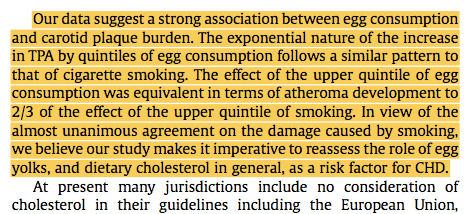
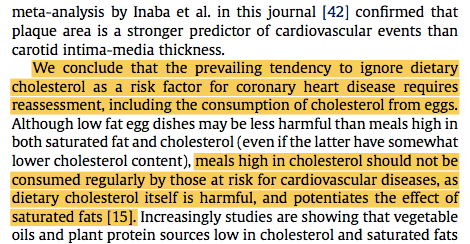
Eggs and Prostate Cancer
Studies have also shown that eating more than 2.5 eggs per week increases the risk for the development of prostate cancer by more than 81% (6,7).
In a study published in 1984, 6,763 men were followed for 20 years to determine the risk for death from prostate cancer due to meat, poultry, milk, cheese, and eggs. They found that drinking 3 or more glasses of milk per week increased the risk for fatal prostate cancer by 140%, and eating 3 or more eggs per week increased fatal prostate cancer risk by 60% (6).
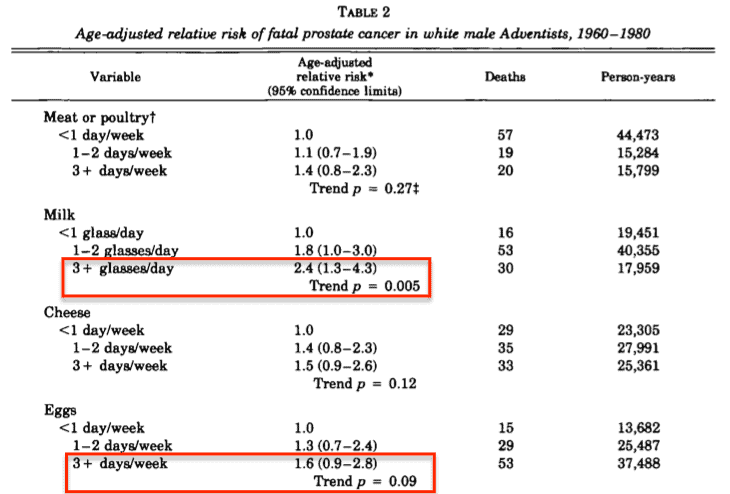
Eggs and Colon Cancer
Overall analysis of more than 44 studies performed in over 400,000 subjects found that the risk for gastrointestinal cancers increased linearly with increasing egg consumption.
The authors found that the strongest correlation was found between egg consumption and colon cancer. Specifically, eating more than 5 eggs per week increased colon cancer risk by 42% (8).
Research suggests that eggs promote the development of prostate cancer because they are high in cholesterol and choline (9–11). Cholesterol is elevated in tumor cells in all tissues, and increased blood cholesterol influences the ability of tumor cells to replicate and migrate.
In other words, increasing blood cholesterol promotes tumor growth and metastases (12–14). Choline is also elevated in tumor cells, and is metabolized in the large intestine into pro-inflammatory compounds that may promote cancer development (15–17).
The image below summarizes the net effect of eating eggs on multiple organ systems:
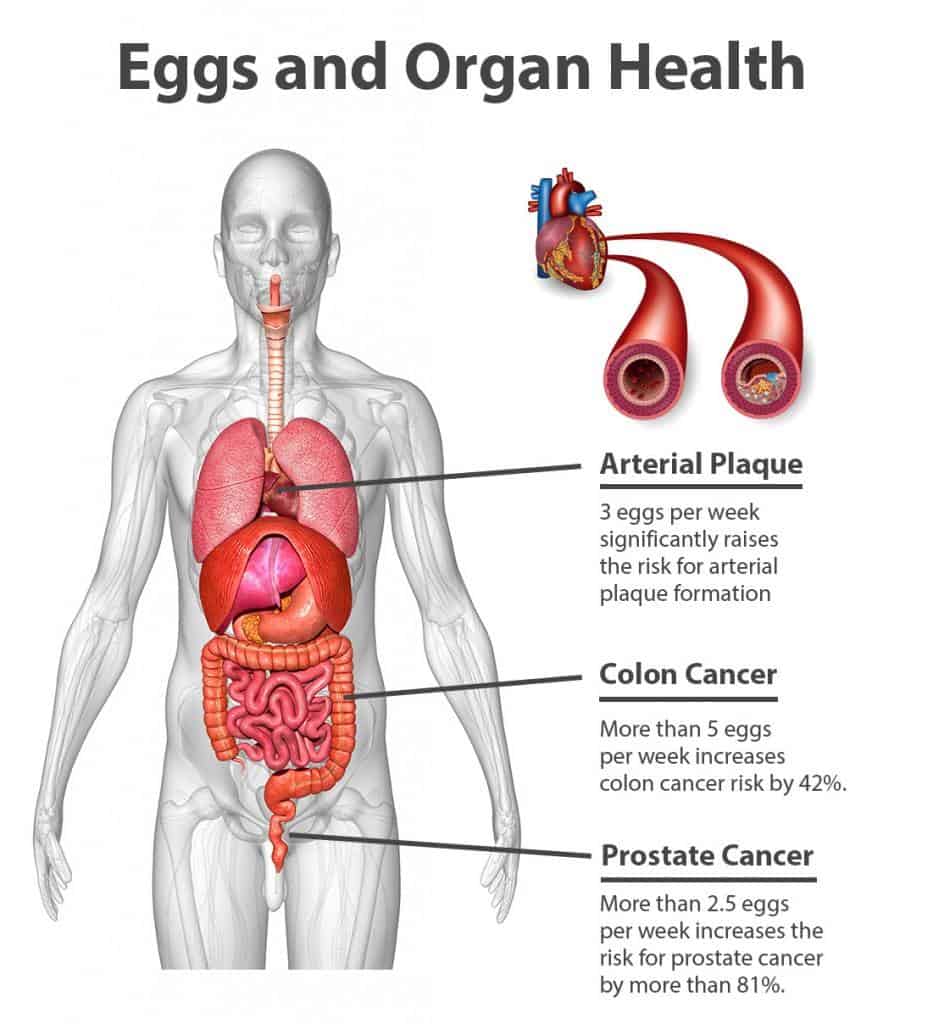
Eggs and All-Cause Mortality
Finally, findings from the 2008 Physicians Health Study found that consumption of more than one egg per day resulted in a 23% increase in the risk all-cause mortality, or death from any cause (1).
This is important because all-cause mortality is the ultimate "risk factor" when evaluating the effect of any lifestyle variable. If your risk for all-cause mortality increases due to any single variable, it means that your risk of premature death from any cause increases.
The data from the Nurses Health Study indicates that eating more than 7 eggs per week doubled the risk of all-cause mortality in male subjects, and that eating more than 7 eggs per week increased the risk for heart disease in males living with diabetes (1).
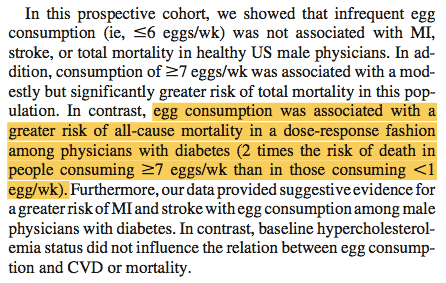
Take Home Message
No matter how you cook it, the overwhelming collection of evidence shows that eggs raise your cholesterol and increase your risk for cardiovascular disease, diabetes, cancer, and all-cause mortality, and that a low-fat, plant-based, whole-food diet can dramatically lower your cholesterol level in a matter of weeks.
The research strongly supports that the cholesterol, saturated fat, and choline in eggs promotes chronic diseases, including diabetes, cardiovascular disease, prostate cancer, and colon cancer.
Based on this information, we cannot safely advocate eating any eggs, both the white and the yellow, and instead advocate for the consumption of plant-rich foods low in fat and protein.
References
Lower Your A1c and Get to Your Ideal Body Weight ... Guaranteed

Your results are guaranteed. Join more than 2,000 members today
Personalized coaching puts you in immediate control of your diabetes health, helps you gain energy, improves your quality of life, and reduces or eliminates your meds.
Leave a Comment Below
How many eggs do you eat per week? What has been your experience eating eggs and maintaining your personal health?

